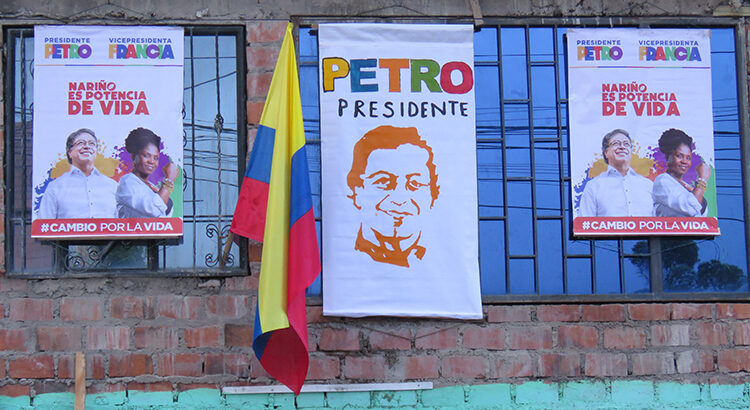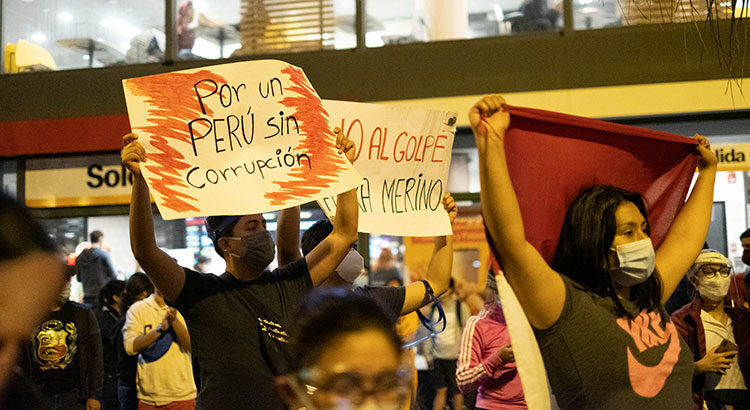Elected on a progressive platform promising respect for human rights, Brazilian President Luiz Inácio Lula da Silva faces the critical challenge of breaking the cycle of state violence and the use of excessive lethal force by public agents. Yet despite the administration being a third of the way through its term, government efforts to curb appear to be stuck in a state of inertia. This blog post examines the problems and opportunities facing Lula’s administration today.
Schlagwort: Lateinamerika
Von der Insel des Friedens zum Kriegszustand: Hintergründe der Gewalteskalation in Ecuador
Ecuador hat in den vergangenen Jahren eine beispiellose Eskalation krimineller Gewalt erlebt. Im Jahr 2023 wies der südamerikanische Andenstaat die höchste Homizidrate Lateinamerikas auf. Als die Gewalt im Januar 2024 erneut eskalierte, rief der neuge-wählte Präsident Daniel Noboa den Kriegszustand aus und erklärte 22 kriminelle Ban-den zu terroristischen Gruppen. In diesem Blogartikel, der auf einem gleichnamigen TraCe Policy Brief basiert, identifizieren wir zentrale Ursachen der Gewalteskalation. Abschließend diskutieren wir, was politisch aus dieser Ursachenanalyse folgt.
Kolumbien nach der Präsidentschaftswahl: Fünf Chancen und eine Herausforderung für die deutsche Außen- und Entwicklungspolitik
Kolumbien hat gewählt: In einem polarisierten Wahlkampf setzte sich bei den Präsidentschaftswahlen vom 19. Juni 2022 der linksgerichtete Kandidat Gustavo Petro knapp gegen den Rechtspopulisten Rodolfo Hernández durch. Dieser hat seine Niederlage öffentlich eingestanden. Ab dem 7. August wird das Land erstmals von einem linksgerichteten Präsidenten geführt und mit der Aktivistin Francia Márquez wird zum ersten Mal in der Geschichte des Landes eine Afrokolumbianerin das Amt der Vizepräsidentin bekleiden. Dieser Blogbeitrag skizziert fünf Chancen und eine Herausforderung für die deutsche Außen- und Entwicklungspolitik, um die guten Beziehungen zu dem lateinamerikanischen Schwergewicht Kolumbien fortzuführen und weiter auszubauen.
Peru: General Elections in the Air, a Crisis of Democracy on the Ground
On 11 April 2021, the Republic of Peru will hold general elections. However, the elections have been overshadowed by the November 2020 Parliamentary Coup and the massive police violence against protesters who have been demonstrating against the controversial outcast of the former President Martín Vizcarra by the Congress. PRIF student research assistant Laura Fischer had the opportunity to speak with Carlos López Felipe Vásquez, a Human Rights activist and a professor for Public International Law at the Technical University of Peru, about the background of the political and constitutional crisis.
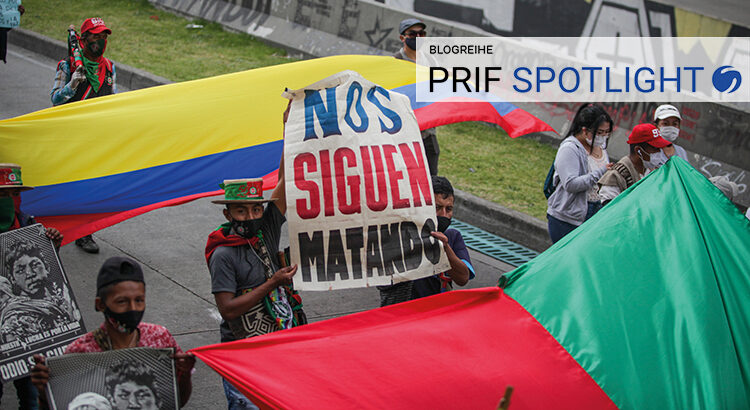
The Political Logic of Violence. The Assassination of Social Leaders in the Context of Authoritarian Local Orders in Colombia
Ever since the conclusion of the peace deal between the Colombian government and FARC guerrilla in late 2016, the number of social leaders murdered has risen sharply – something that even the latest developments surrounding the Covid-19 pandemic have had little bearing on. These acts of violence are frequently attributed to the presence of armed non-state actors and their fight for control over illegal economies. And yet, the situation has an unmistakably political side to it, reflecting the very modus operandi of local authoritarian orders in Colombia. For counterstrategies to be developed, it is crucial to acknowledge the political logic behind the violence.
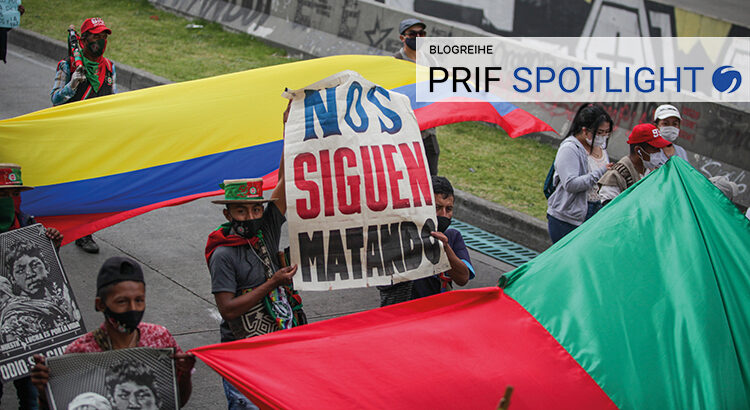
Die politische Logik der Gewalt. Zur Ermordung sozialer Aktivist*innen im Kontext autoritärer lokaler Ordnungen in Kolumbien
Seit dem Abschluss des Friedensabkommens zwischen der kolumbianischen Regierung und der FARC-Guerrilla Ende 2016 sind die Morde an sozialen Aktivist*innen deutlich angestiegen. Daran hat sich auch unter den Bedingungen der COVID-19-Pandemie nichts geändert. Häufig wird diese Gewalt allein auf die Präsenz bewaffneter, nichtstaatlicher Akteure und deren Kampf um die Kontrolle illegaler Ökonomien zurückgeführt. Sie hat aber zugleich eine dezidiert politische Seite und spiegelt konkret die Funktionsweise lokaler autoritärer Ordnungen in Kolumbien. Diese politische Logik anzuerkennen, ist wichtig, um Gegenstrategien zu entwickeln.
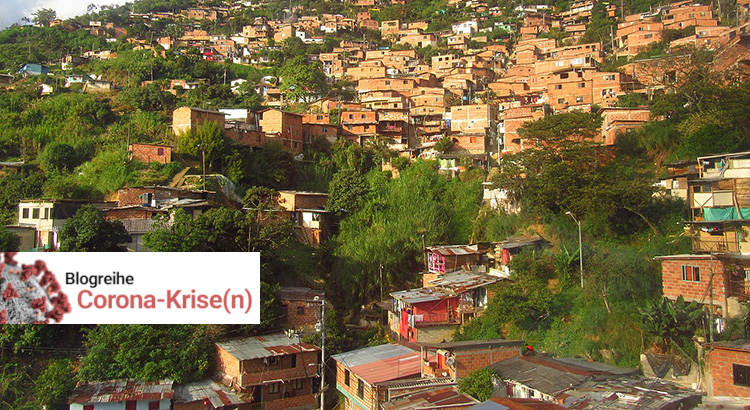
Se trata de estructuras, no de ayuda – Asentamientos informales y la desigualdad de la pandemia en Medellín, Colombia
En Colombia, el 25 de marzo se instaló una cuarentena nacional debido a la pandemia de la Corona. Pocos días antes, varias organizaciones no gubernamentales y comunitarias ya habían publicado una declaratoria con una alerta temprana a la alcaldía de Medellín – la segunda ciudad más grande de Colombia, premiada varias veces por su innovadora política urbana. En ese declaratoria, pidieron que se prestara especial atención a las personas que vivían en asentamientos informales y zonas periféricas: Las desigualdades existentes y las diversas formas de discriminación se exacerban debido a la creciente precarización de la informalidad a través de las medidas preventivas actuales. Los residentes de los barrios marginales se ven privados de los modos de sustento que han generado de forma independiente. Las intersecciones de las opresiones exponen a esas personas a riesgos mortales. Se necesita urgentemente un ingreso básico y protección de la salud.
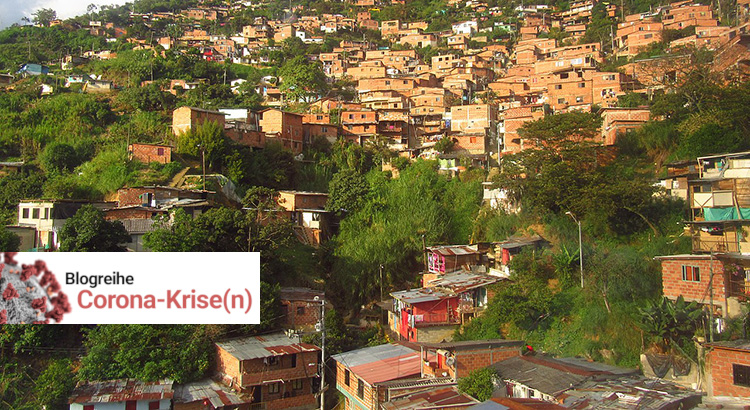
It is About Structures, Not Aid – Informal Settlements and the Inequality of the Pandemic in Medellín, Colombia
In Colombia, a national quarantine due to the Corona pandemic was installed on March 25th. A few days earlier, several non-governmental and community-based organizations had already published an alert statement in the city of Medellín – the second largest city of Colombia, awarded multiple times for its innovative urban policy. In this statement, they called for special attention to people living in informal settlements and peripheral areas: Existing inequalities and various forms of discrimination are exacerbated by the increasing precarisation of informality through current preventive measures. Residents of marginalized neighbourhoods get deprived of livelihoods that they have built up independently. The intersections of oppressions expose those people to deadly risks. A basic income and health protection are urgently needed.
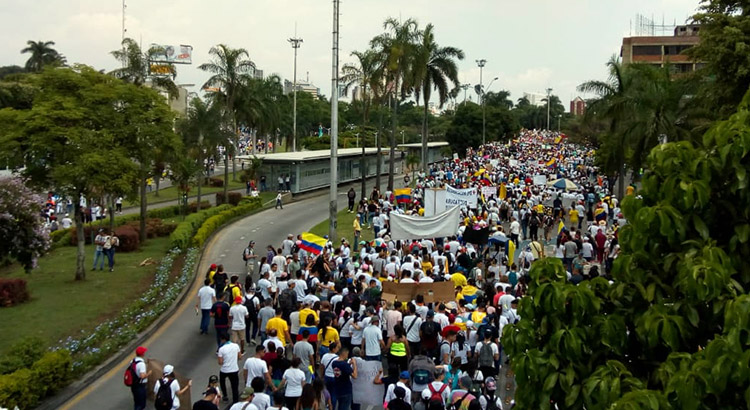
Kolumbien: Der Frieden bringt neue Konflikte
Eine Welle von Protesten hat die Regierung Kolumbiens unter Druck gesetzt. Das ist auch eine Frucht des Friedensabkommens mit der FARC-Guerilla – nun ordnet sich die politische Landschaft neu.
Die bolivianisch-deutsche Lithiumkooperation im Zeichen der politischen Krise in Bolivien
Derzeit überschlagen sich die Ereignisse in Bolivien. Nach wochenlangen Protesten gegen Unregelmäßigkeiten bei den Präsidentschaftswahlen, trat Präsident Evo Morales am 10. November zurück und ging ins mexikanische Exil. Eine Übergangsregierung bereitet Neuwahlen vor, während die Gewalt zu eskalieren droht. Bisher sind fast 30 Menschen ums Leben gekommen. Für Deutschland hat die politische Krise direkte Auswirkungen. Kurz vor seinem erzwungenen Rücktritt kündigte Morales einen bolivianisch-deutschen Kooperationsvertrag zum Abbau von Lithium. Eine Affekthandlung, die tiefen Einblick in die komplexe politische Gemengelage im Andenland gewährt. Die dahinterstehenden Auseinandersetzungen zeigen aber auch wie sozial-ökologisch komplex der Abbau des zentralen Rohstoffs der Elektromobilität ist.


